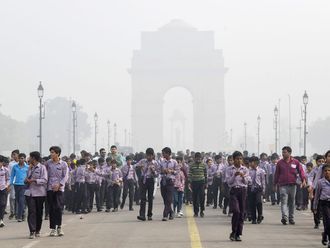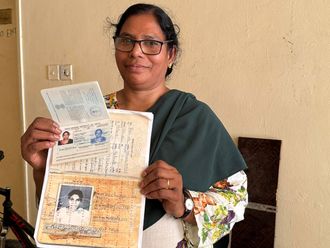Dublin/New Delhi: Sadness, anger and outrage ruled in the virtual world on the death of Indian woman Savita Halappanavar in an Ireland hospital after she was allegedly denied an abortion in the pro-life Catholic country.
Under the hashtags #RIPSavita and #legislateforX, people on twitter voiced their outrage over the death of Savita last month.
LeanneWoodfull posted: “I’m glad #Savita’s story is spreading worldwide, Ireland needs to put in the spotlight for this monstrosity. #RIPSavita”. ThisGodRocks tweeted: “It’s so fundamentally wrong to place religious beliefs above saving a human life. Savita had a heartbeat too.”
Two probes have been ordered in Ireland into the death of Savita who was 17 weeks pregnant. Savita, 31, a dentist, presented with back pain at the University Hospital Galway on October 21. She was found to be miscarrying, and died of septicaemia a week later.
Her husband, Praveen Halappanavar, 34, an engineer at Boston Scientific in Galway, said the couple had asked the hospital several times to terminate the pregnancy after coming to know that she was miscarrying. This was refused, according to Praveen, because the foetal heartbeat was still present and they were told, “This is a Catholic country.”
She spent another two and a half days “in agony” until the foetal heartbeat stopped. The dead foetus was removed and Savita was taken to the intensive care unit, where she died of septicaemia on October 28.
Speaking to Irish Times from Belgaum in Karnataka where he took his wife’s body for the last rites, Praveen said the doctor had told them the baby wouldn’t survive. His wife was in agony, and each time the doctor came on his rounds he would tell her “As long as there is a foetal heartbeat we can’t do anything.”
Ireland’s constitution officially bans abortion, but a 1992 Supreme Court ruling found the procedure should be legalised for situations when the woman’s life is at risk from continuing the pregnancy. However, five governments since then have refused to pass a law resolving the confusion.
Pro-choice protests have been planned outside the Dail, the Irish parliament, while others are planning a protest outside the Irish embassy in London.
Dearbhail McDonald, legal editor of the Irish Independent, in an article titled “We need legislation, we need it now” writes: “At heart, though, the underlying societal rage stems from the inexcusable failure by successive governments to clarify when women in Ireland can avail of medical abortions in the limited circumstances that our law permits since the landmark 1992 X case.”
“As a result of the X case, abortion is permissible in Ireland if it is established that there is a real and substantial risk to the life - as distinct from the health - of the mother which can be avoided only by the termination of the pregnancy.”
“But no government has ever introduced laws to give effect to the ruling and there is no means for any woman to clarify whether she qualifies for a medical termination under X.”
Ireland’s Minister for Health James Reilly has received the report of an expert group on the 1992 judgment.
Ireland Prime Minister Enda Kenny said he would not comment until “we are in possession of all of the facts”.
Colette Browne tweeted: “Enda Kenny says to WAIT WAIT WAIT. Continue to WAIT for reports that should have been published months ago. Disgrace.”
Another tweet went: “Dear Ireland, get your priorities right. Legislate for basic human rights; stop worrying about medieval religious beliefs.”
Mauricegueret posted: “Now that Ireland has a prized seat on the UN Human Rights Council, it can spread its medieval misogyny worldwide”.
The Womenscouncilireland posted: “The death of Savita Halappanavar is a national shame, sincere condolences to her husband and family.”
Other posts went: “20 years after X case, another pivotal day. Another tragedy for a family and a wake-up call for us all. Govt must legislate.”
“A woman’s preventable death is the sad and shameful result of years of political and moral cowardice in Ireland.”
The Indian government has voiced concern over the “tragic death” and said its embassy in Dublin is following the case.












